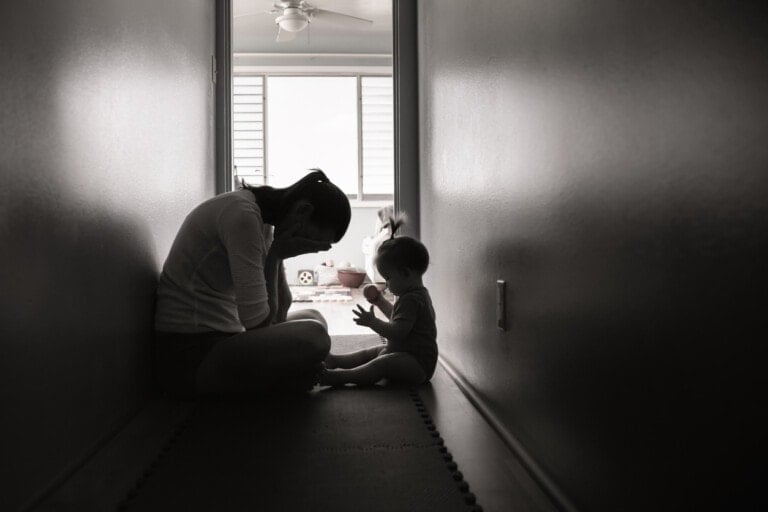We all have angry moments as moms. Ugly moments. Tense moments. Moments that, if we were on a camera, might make us cringe when we are at the end of ourselves. And certainly, moments that don’t make us feel like super mom. But while we like to beat ourselves up for having these moments, it’s better to focus on what is causing them to occur and then take action.
While it is normal to lose your temper at your children, especially when you are exhausted, stressed, or feeling unsupported, there is a time when we can rage and cross the line of what is healthy for our children or ourselves in expressing anger. And it’s important to know when we might be in a place in need of help.
What Is Mom Rage?
What is the difference between rage and anger? Rage is when you feel your anger is uncontrollable, and you may do things or say things that are above and beyond the normal reaction to a circumstance. Another good indicator of rage is when this happens regularly instead of every once in a while.
For example, your toddler spills milk for the sixth time that week. It’s almost like a switch inside you gets flipped, and instead of cleaning up the milk, you throw the milk carton across the room. Or maybe you yell something toward your child that is drastically more severe than, “I need you to use two hands next time, or we will not be able to use a cup without a lid.” Instead, you might say, “You are the clumsiest kid I have ever met! I can’t stand it!”
It is also a sign that you may struggle with rage if others say that your reactions make them uncomfortable when they are around. Children often adapt to how they are treated, even if wrong. But, other adults or children who are not usually in the home can often identify when a person is in an overly emotional state.
Why Does It Happen?
More often than not, mom rage is not a diagnosis. Instead, it is merely a symptom of a mom needing self-care. Moms are often tired. Isolated. Overworked. Overextended. And stressed. And often, they cannot remember the last time they did something for themselves.
How to Combat Mom Rage
Instead of feeling guilty that you are struggling, it’s important to take steps to become healthy both physically and emotionally so that you can be in a place to deal well with your anger. Here are some steps to get healthy.
Step 1. Admit You Are Struggling to a Spouse, Friend, or Support Person
Decide together if your anger may benefit from seeing a professional. There is no shame in seeing a therapist. More often than not, once a relationship is developed, people are happy to say how much they love therapy.
Step 2: Release Your Guilt for Struggling
Guilt will only cause you to remain stuck in negativity and inaction. No one wants to struggle with anger. Instead of feeling guilty, decide that you are ready to make a change and move forward.
Step 3. Make a List of Things That Are Causing You Stress
Once you’ve made a list of your stressors, you can identify what can be changed and what cannot. For example, you can improve poor eating. But having a husband who works night shifts may not be able to be changed. Sometimes, it is enlightening to see how many stressors we have going on around us, and hopeful because there are easy changes you can make to help your mood. For example, even though you may love watching late-night TV, it may not be the best choice if you wake up cranky and tired every morning.
Step 4. Identify at Least Two New Self-Care Habits You Can Add to Your Life
Once you’ve identified these habits, schedule them in your daily life. If you know you love running, find a time to ensure this happens. If you know warm baths allow you to relax, figure out the best way to fit this into your schedule. Often, there is time for self-care, but we don’t prioritize it, and that has to stop. Self-care has to be a priority when dealing with explosive emotions.
Step 5. Develop a Plan to Figure Out What Triggers Your Mom Rage
Often, the same patterns happening over and over cause our emotions to build and build. But if we do not have a plan to react differently, we often continue in the same patterns. So, write down at least three scenarios where you find yourself becoming triggered. Then, write down a way to respond more effectively and not ragefully. Often, just doing anything differently can break a bad pattern with children.
For example, if you get outraged when you see your house is messy, then help your children develop a chore system or way to pick up their area in a proactive manner. Often, small proactive changes in the home can make a massive difference in the home’s emotional climate.
Step 6: Lastly, Develop a Plan To Calm Yourself Down When Triggered
Inevitably, even with all of these things in place, there will be times when you find yourself triggered by situations with your children. So, the most important thing you can do is develop a plan for calming down in a healthy way. Often, this means leaving the room and telling the kids that you are going to calm down and reset for a moment.
You can talk about this openly beforehand and tell them when you are doing it. It is because you do not want to yell and get mad. You can also come up with an activity they do during this time or a show they watch so everyone has a plan in place. And slowly but surely, everyone will see the benefit of this plan. You can even name it, like “Mommy’s Time Out Time.”
Mom rage is something that is not meant to be bottled up. Instead, address it and let it go! If you are struggling today, reach out to a friend and ask for help. There are therapists in every state that offer online therapy, and you can find a therapist near you here.































